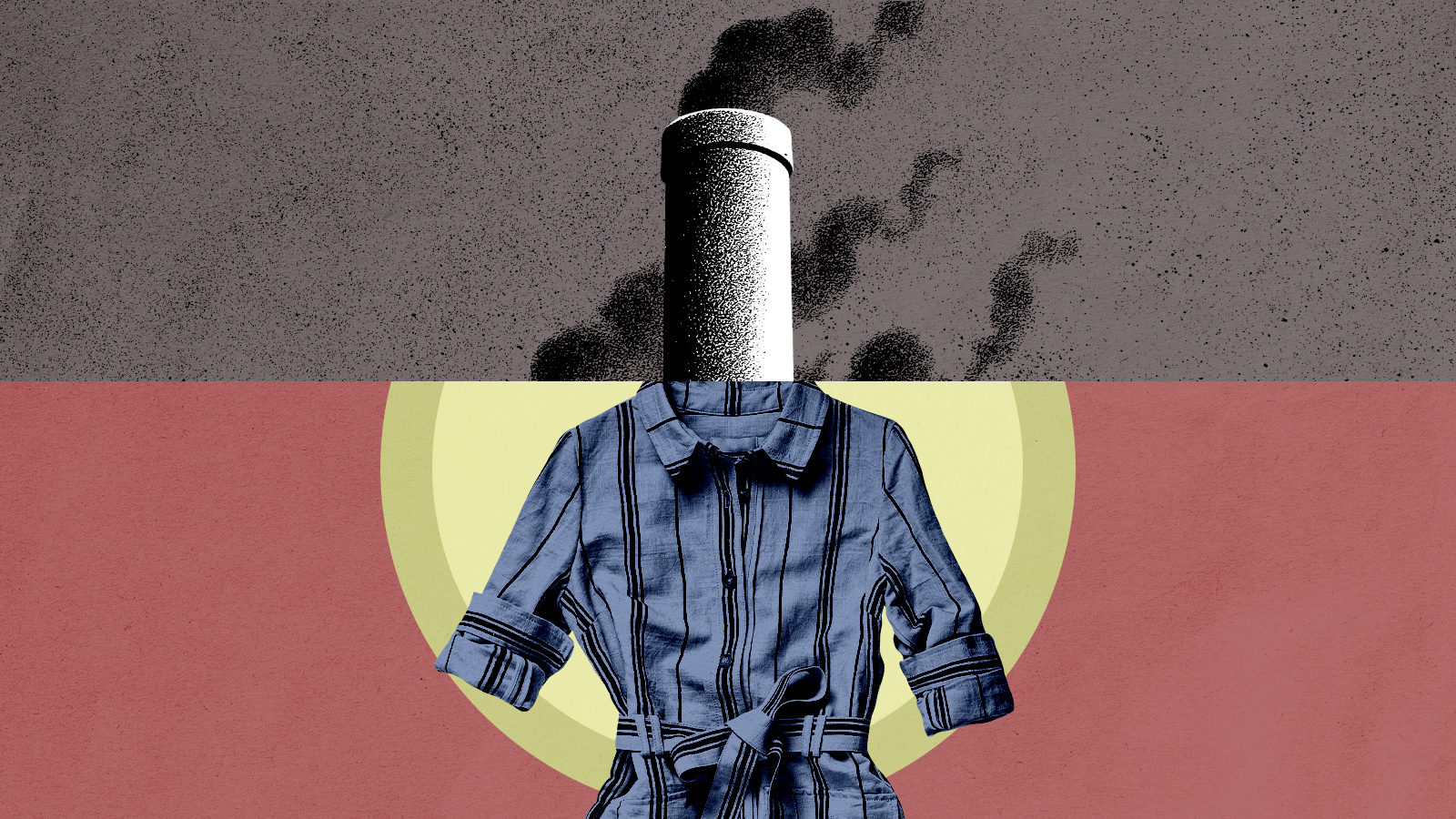The most eco-conscious generation? Gen Z's fashion fixation suggests otherwise.
Can Depop and Shein coexist in a principled closet?


A free daily email with the biggest news stories of the day – and the best features from TheWeek.com
You are now subscribed
Your newsletter sign-up was successful
Gen Z's buying habits — which run the gamut from eco-friendly resale websites like Depop to wasteful fast-fashion retailers like Shein and Fashion Nova — might seem incongruous at best, or hypocritical at worst.
That's because, despite being heralded as the most eco-conscious generation, Gen Z's infatuation with affordable clothes in the face of the growing awareness of their environmental ramifications raises questions about what the allure of resale and sustainable fashion actually is. Are young adults really buying their clothes with the planet in mind? Or does resale simply offer another affordable consumption option that allows them to keep up with ever-changing trends in the social media age?
I'd vote the latter.
The Week
Escape your echo chamber. Get the facts behind the news, plus analysis from multiple perspectives.

Sign up for The Week's Free Newsletters
From our morning news briefing to a weekly Good News Newsletter, get the best of The Week delivered directly to your inbox.
From our morning news briefing to a weekly Good News Newsletter, get the best of The Week delivered directly to your inbox.
The proliferation of resale retail sites has allowed anyone to become a virtual store owner, selling and shipping their goods to buyers all over the world. ThredUp, the largest of the online consignment stores, claims that by 2029, off-price retailers such as itself will make up 19 percent of the market, even as department stores selling new clothes dwindle to just 7 percent. In August, clothes-selling app Depop counted 30 million active users across 150 countries. When retail suffered during the pandemic, the reseller sold around $660 million in merchandise in 2020, actually doubling sales from the year prior. Even Gucci and Burberry have launched their own resale programs to get in on the game.
All these companies share a key demographic in their customer base: Gen Z. Ninety percent of Depop's users are younger than 26. As Esquire UK reported, "Depop — like its contemporaries The Real Real, Grailed, Poshmark, and Vestiaire Collective — has capitalized on a desire among young consumers to shop vintage." But is the popularity of Depop actually a reflection of Gen Z's heightened environmental consciousness?
It's true the environment tops the list of concerns for Gen Z; after all, they're the first generation to grow up with an awareness of the numerous and constantly worsening effects of climate change. And for at least some, this anxiety informs their shopping choices: In the words of one high school student who spoke to The New York Times, thrifting is the perfect answer for someone money-conscious and sustainability-focused, as "it's usually very cheap and helps keep perfectly fine clothing out of landfills!"
But complicating that conclusion is the parallel explosion of environmentally detrimental fast fashion e-commerce companies like the Chinese retailer Shein. In a revealing 2020 Vogue Business survey, more than half of the 105 members of Gen Z surveyed reported buying "most of their clothes" from fast-fashion brands. Shein alone earned almost $10 billion in 2020 — its eighth consecutive year of revenue growth over 100 percent. In May of this year, the Shein app overtook Amazon to become the most downloaded shopping app in the U.S. The site is also not only one of the most discussed brands on social media platforms like TikTok and YouTube, but also the most-visited fashion and apparel site in the world.
A free daily email with the biggest news stories of the day – and the best features from TheWeek.com
But online retailers like Shein are not a new phenomenon — or not exactly. Today's trendy fast-fashion retailers stole a page from a playbook perfected over the past two decades by brick-and-mortar stores like Zara and H&M, whose extremely low prices and knock-off designs contribute to their increased consumption as well as their dispensability. Clothing from Shein, for example, typically ranges from between $8 to $30. And while Shein has become the leader in this market, there are plenty of other places to source cheap fast-fashion items, from Missguided and Fashion Nova to Boohoo and Pretty Little Thing. This model has clearly profited off Gen Z's desire to pay less for more.
All this consumption is not without consequences. While fast fashion brands typically come under fire for dubious production and worker treatment practices, their scale and consequent waste are also incredibly unsustainable. Fast fashion companies produce 10 percent of global carbon dioxide emissions every year while utilizing an estimated 1.5 trillion liters of water annually, according to the Intergovernmental Panel on Climate Change. The global fashion industry itself contributed to 2.1 billion metric tons of greenhouse gas emissions in 2018, which amounts to 4 percent of total global emissions — that's more than double the emissions of the global aviation sector. What's worse, over 50 percent of fast fashion garments are reportedly disposed of within a year of manufacturing; the average American throws out an estimated 70 pounds of textiles and clothes every year. Meanwhile, Shein and its ilk churn out thousands of items a week for lower and lower prices thanks to a business model that relies on little care for environmental costs or the subsequent accumulation of waste.
By being part of the circular economy, sites like Depop do provide a method for reducing waste and emissions — and in a perfect world, it'd reduce the scale of production currently required of the fashion industry. But here's the sticking point: As a study by sustainability consulting firm Quantis notes, to be effective, a circular economy must not lead to more consumption, which can occur if there is a "rebound effect of increased or ongoing fast fashion consumption."
Thus, while Depop's popularity continues to rise, so does the pressure to have a seemingly infinite closet that can keep up with the breakneck speed of trends. This need has been appeased by fast fashion, but also by the opportunity provided by resale sites to make room in one's closet for more ... and more and more. As one Depop seller revealingly writes in her bio, "I love all of these clothes but I hate wearing things more than once."
So while online consignment store sites are on the rise, for the time being, they're not much of a threat to their less sustainable e-commerce competition. Members of Gen Z want more for less, and resale has become just another method to sustain this consumption.
Perhaps, as the effects of climate change multiply, a greater sense of urgency will trickle down to Gen Z's buying habits. But for now, sustainability is not necessarily what's "in" for Gen Z. It's still about the look — secondhand or not.
Alex Reice is a producer at World 50. She is a recent alumna of Brown University, where she graduated magna cum laude with a degree in international relations. She lives in New York.
-
 The ‘ravenous’ demand for Cornish minerals
The ‘ravenous’ demand for Cornish mineralsUnder the Radar Growing need for critical minerals to power tech has intensified ‘appetite’ for lithium, which could be a ‘huge boon’ for local economy
-
 Why are election experts taking Trump’s midterm threats seriously?
Why are election experts taking Trump’s midterm threats seriously?IN THE SPOTLIGHT As the president muses about polling place deployments and a centralized electoral system aimed at one-party control, lawmakers are taking this administration at its word
-
 ‘Restaurateurs have become millionaires’
‘Restaurateurs have become millionaires’Instant Opinion Opinion, comment and editorials of the day
-
 David Attenborough at 99: a 'radical' voice for climate action
David Attenborough at 99: a 'radical' voice for climate actionIn The Spotlight In his new film 'Ocean', TV's best-known naturalist delivers his strongest message yet
-
 The secrets of lab-grown chocolate
The secrets of lab-grown chocolateUnder The Radar Chocolate created 'in a Petri dish' could save crisis-hit industry
-
 Kyoto: 'total thrill ride' explores pivotal climate change conference
Kyoto: 'total thrill ride' explores pivotal climate change conferenceThe Week Recommends Play centres on 'cut-throat diplomacy' surrounding the United Nations
-
 Bovaer: the new dairy additive prompting boycotts and conspiracy theories
Bovaer: the new dairy additive prompting boycotts and conspiracy theoriesIn The Spotlight Manufacturer says it wants to reduce methane emissions from cows but social media criticism has grown
-
 4 tips for hosting an ecofriendly Thanksgiving
4 tips for hosting an ecofriendly ThanksgivingThe Week Recommends Coming together for the holidays typically produces a ton of waste, but with proper preparation, you can have an environmentally friendly gathering.
-
 In 'Twisters,' there are no winds of (climate) change
In 'Twisters,' there are no winds of (climate) changeTalking Points The weather-focused blockbuster kicks up a swirl of controversy over a conspicuous and deliberate omission
-
 Jurassic Park: how dinosaurs put wine on your table
Jurassic Park: how dinosaurs put wine on your tableUnder The Radar The disappearance of the 'lumbering beasts' allowed the grape to 'take over the world'
-
 The push for more climate change stories in Hollywood
The push for more climate change stories in HollywoodThe Explainer America's entertainment industry has often been accused of marginalizing stories about the planet
